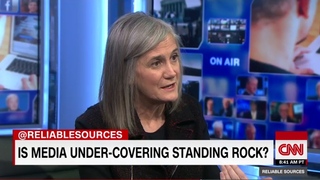
By Amy Goodman & Denis Moynihan
Hurricane Matthew has come and gone, leaving devastation in its wake. So far, at least 1,000 people are reported to have died in Haiti, and at least 39 have died throughout the southeastern United States. In North Carolina, the rivers are still rising. In this election year, given the destruction, you would think climate change would be a major issue. In the presidential debates, which tens of millions watch, there has hardly been a mention. It is what is happening outside, at the grass roots around the country, that gives us hope.
The movement to combat climate change is growing dynamically and unpredictably, and is facing increasing repression from the fossil-fuel industry and government authorities. There is perhaps no better example of this than the Standing Rock Sioux tribe’s resistance to the Dakota Access Pipeline.
The tribe has made treaties with the United States for more than a century and a half, and every one of them has been broken by the federal government. So it should come as no surprise that a panel of federal judges ruled against the Standing Rock Sioux, allowing construction of the controversial $3.8 billion oil pipeline to continue. To add insult to injury, the decision came, surprisingly, on a Sunday, on the eve of Columbus Day, which many indigenous people view as a day celebrating the start of the genocide against native peoples in the Western Hemisphere.
“The Standing Rock Sioux tribe is not backing down from this fight,” Dave Archambault II, chairman of the Standing Rock Sioux tribe, said in a statement. “We are guided by prayer, and we will continue to fight for our people. We will not rest until our lands, people, waters and sacred places are permanently protected from this destructive pipeline.”
In a break with history, though, and despite the court’s order, the U.S. Army, along with the departments of Justice and the Interior, issued a statement as well, saying: “The Army will not authorize constructing the Dakota Access Pipeline on Corps land bordering or under Lake Oahe. We repeat our request that the pipeline company voluntarily pause all construction activity within 20 miles east or west of Lake Oahe. We also look forward to a serious discussion during a series of consultations … on whether there should be nationwide reform on the Tribal consultation process for these types of infrastructure projects.”
It is on that Army Corps of Engineers land that the main resistance camps have been set up, where thousands, mostly indigenous people from more than 200 tribes from across the U.S., Canada and Latin America, have gathered to protect land and water from the pipeline. This is Lakota-Dakota ancestral land, taken without tribal consent by the U.S. Army.
In August, these protectors — they don’t call themselves “protesters” — put out a call for international prayers and solidarity. Each day, creative acts of nonviolent direct action are happening, up and down the 1,200-mile length of the proposed pipeline. On Wednesday, in Keokuk, Iowa, 31-year-old Krissana Mara locked herself to an excavator at the site where the Dakota Access Pipeline is slated to cross the Mississippi River. The growing resistance there, called #MississippiStand, seeks to block the pipeline from traversing that river, as the Standing Rock actions are blocking the pipeline from going under the Missouri River.
Meanwhile, in a stunning coordinated action, nine climate activists were arrested Tuesday for attempting to shut down all tar-sands oil coming into the United States from Canada by manually turning off pipelines in Minnesota, Montana, North Dakota and Washington state. One of the protesters, Leonard Higgins, said on a video later posted online from the pipeline site in Coal Banks, Montana: “We’re in a state of emergency to protect our loved ones and our families, our communities. We need to step up as citizens and take action where our leaders are not. That’s what I’m prepared to do when I close the valve.”
Also among the nine arrested was Ken Ward. In 2013, Ward and Jay O’Hara anchored a small lobster boat off the coast of Massachusetts, blocking a ship from delivering 40,000 tons of coal to the Brayton Point power plant, one of the region’s largest contributors to greenhouse gases. In a remarkable turn of events, their prosecutor, local District Attorney Samuel Sutter, dropped the criminal charges against the men, saying: “Climate change is one of the gravest crises our planet has ever faced. In my humble opinion, the political leadership on this issue has been gravely lacking.”
Perhaps leadership from the top has been lacking. But from a small boat bobbing in the ocean to the growing resistance camps in North Dakota, the climate movement is on the rise.












Media Options